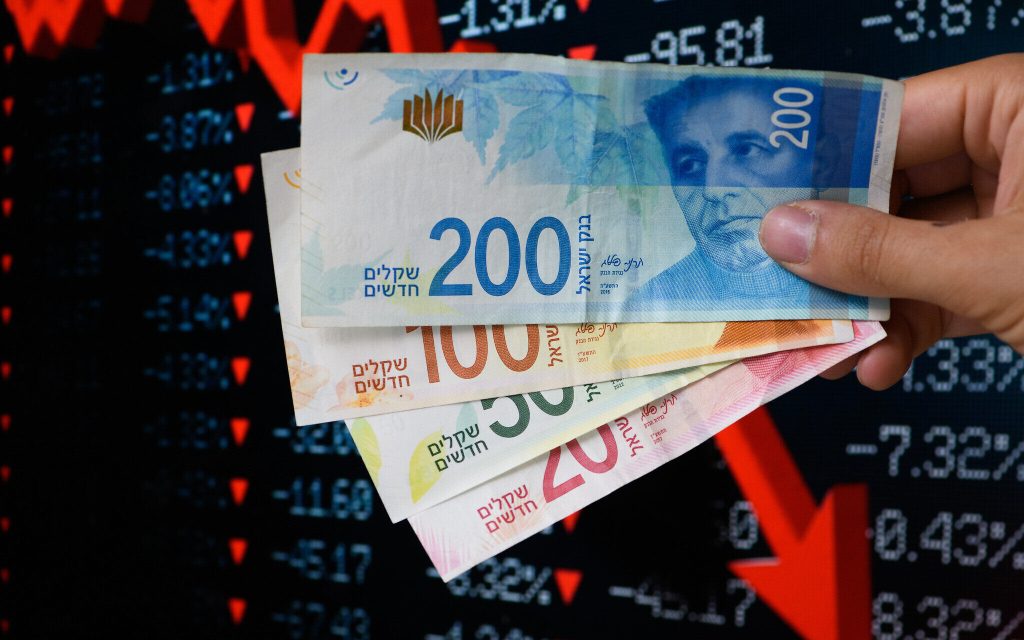Israeli shekel Falls to Seven-Year Low Despite Efforts to Support Exchange Rate with $30 Billion
The Israeli shekel continued its sharp downward trend against the US dollar by about 2.5%, and the exchange rate surpassed 3.95 shekels per dollar, despite the intervention of the Israeli Central Bank yesterday to prevent the shekel from collapsing by pumping $30 billion to support the exchange market, in light of the worsening security situation in Israel as a result of Operation “Al-Aqsa Flood”, which began on Saturday.
According to the Israeli website Globes, the exchange rate between the shekel and the dollar is presently 1.01% lower than it was yesterday, at 3.9494 shekels per dollar, while the exchange rate between the shekel and the euro is 1.42% higher, at 4.1783 shekels per euro.
In a press briefing yesterday, bank officials stated that the impact of the intervention should not be measured over the course of a single session, but rather after a few days, when the bank will review its market activity.
Golan Bennetta, head of the Markets Department at the Bank of Israel, stated, “During overnight trading in Asia, the exchange rate reached 4.2 shekels and even 4.3 shekels to the dollar, so it was essential to increase certainty in the local market to prevent overreactions as much as possible.” In the marketplace.”
The Globes website reported that some believe the shekel will continue to decline against the dollar, citing Yossi Freeman, CEO of the Prico Group, as saying, “It appears that the price of the shekel against the dollar will decline, fixing the dollar at 4.2 shekels,” in light of the worsening security situation.
Fryman added that in this instance, the Bank of Israel would have to inject more money into the market to stabilize the exchange rate, emphasizing that “the rate of devaluation of the shekel is strong and rapid.”
Harel Gilon, co-chief executive officer of Oppenheimer Israel, stated that the Bank of Israel’s intervention is unprecedented in scale, as the bank has foreign currency reserves totaling $200 billion and is planning to sell $30 billion. The bank has not yet disclosed the volume of its sales, but with this enormous figure, it seeks to intimidate speculators and those seeking to profit from the shekel’s devaluation by exploiting its vulnerability.The bank has demonstrated its commitment and determination to stabilize the market.”
If the conflict had not occurred, according to Gilon, the Central Bank of Israel would have raised the present interest rate of 4.75 percent by the end of this month. He stated that the bank will shortly contemplate lowering the interest rate. Gillon stated that it is evident that economic activity will slow down as a result of the number of reservists being summoned to active duty.
Moreover, he notes that during conflict, entire sectors, such as tourism, cease to exist. Restaurants, stores, and foreign travel ceases, and this will unquestionably alter Israel’s inflationary situation and also contribute to an economic decline.
The Israelis were in a state of frantic purchasing after the internal command of the Israeli army issued orders for people to stock up on tinned foods, water, required medications, torches, and radios in order to survive for 72 hours inside their residences if necessary.
Yesterday evening, when the order was issued, Israelis raced outside and vacated supermarkets, grocery stores, and convenience stores. Due to a lack of staff and supplies, stores were already experiencing shortages of fruits, vegetables, eggs, pastries, and other products. This was because producers in the south were unable to harvest and transport the goods.
This morning, some of the nation’s largest supermarket chains began limiting how much consumers can spend on essential items. Shufersal Co., Ltd. announced that there will be restrictions on the purchase of controlled-priced water, eggs, milk, and bread in order to satisfy the diverse needs of customers.
